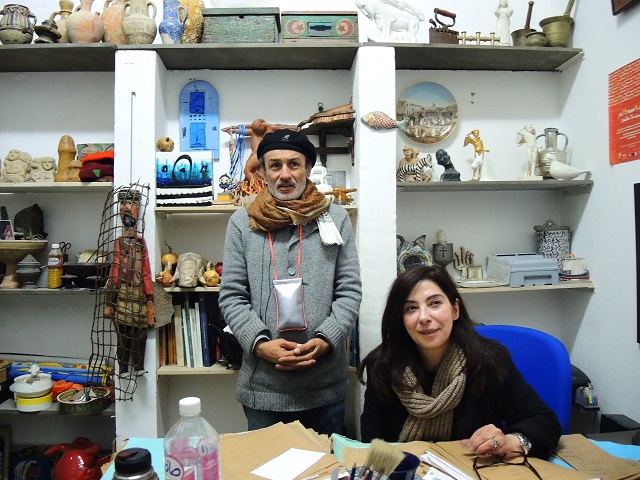The Driba Atelier (or L’atelier Driba) in Tunis is one of those unique places that emanate a natural and humble love for creativity. Their motto “on travail pour le plaisir et avec plaisir” (we work for pleasure and with pleasure), their obsession: to restore objects from the past and preserve the Tunisian handicraft heritage.
One of the reasons why artisanal work is sometimes lost in the fury of modernization is because its methods, designs and inspirations get stuck in a rut. Ancient motifs are repeated and revisited, techniques stagnate and the final product risks becoming a serially produced piece.
It takes the mind of an artist, to remove the fear of deviating from certain parameters. So when an artist’s mind merges with the dexterous hands of artisan, the final product is simply mind blowing.
(RELATED: Tunisia’s environmental progress slides back 25 years)
The Driba atelier was founded in 1993 by collector Mohammed Messaoudi (above), and the Driba workshop is divided into “artisanal” sections and interspersed with piles of antique and recuperated materials from old Tunisian homes. It is filled with artisans that cover virtually all aspects of Tunisian handicraft: carvers, mosaic layers, carpenters, cabinetmakers, blacksmiths, painters, weavers, seamstresses, embroiderers, jewelers freely tinker away; painting, sculpting, cutting, laying, modeling, weaving and engraving.
The atmosphere is familiar and cordial and the procedures are unstructured; the bliss of unpretentious anarchic creativism.
As Abla Hajeri (above), sales manager of Driba, explains “when someone comes to work at Driba, he starts by doing a little bit of everything, moving freely as he wishes across the different mediums until he finds his specialization and sticks with it, after young aspiring artisans find their medium, they are mentored by an elder expert in that medium.”
The artistic flare comes through a collective of artists like, Mohammed Messaoudi, who give each artisan an inspiration, a project to follow through. The final pieces are unique, artistic, skillfully produced, at times, functional (look at these Tunisian handmade tiles) and most definitely Tunisian.
This new vision of artisanal work is more sustainable. It not only serves to preserve techniques but also advance the artistic boundaries of artisans whose work becomes more appreciated and appetizing because it is unique and moves away from the security of reproducing ancient motifs.
But let’s not romanticize this process: most artisans work to earn their daily bread. The work is labor intensive and often working conditions make this work unappealing to the young generations.
Artisanal work risks disappearing, not because there isn’t a demand for their work, but because they are not being paid a fair value for their work. One way of ensuring fair pay is to buy directly from artisans: only this way are the creators valorized, directly appreciated and safeguarded.
If you are ever in Tunis make sure to pass by the Driba Atelier, your eye will not know where to stop looking.
Address: 72 bis, rue Sidi Frej Ennouairi, 2036 Soukra, Tunisia Tel: 71759363 Fax: 71759179 E-mail: [email protected]





